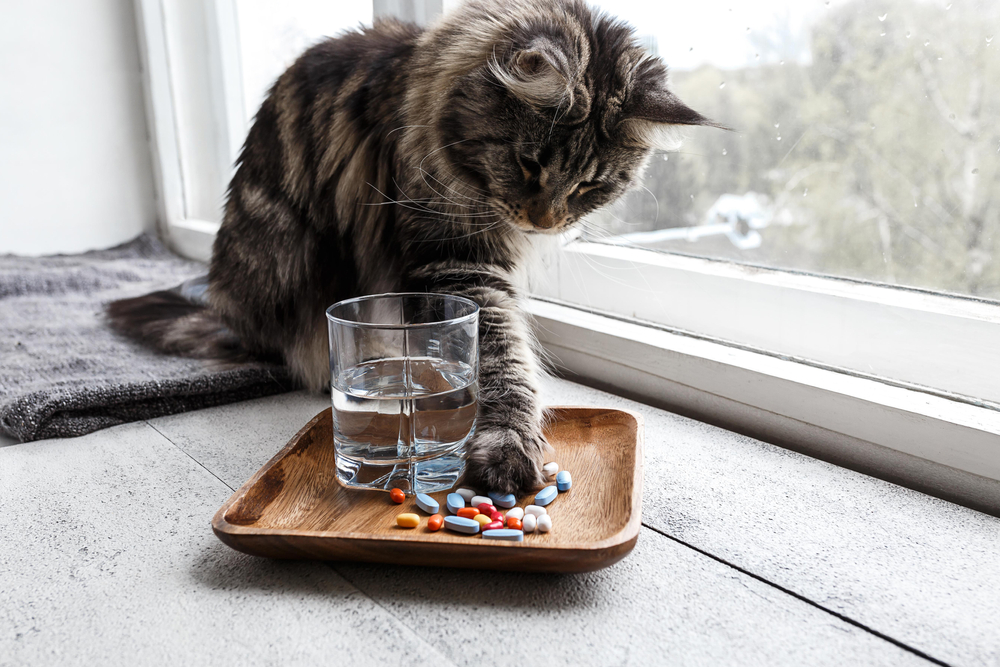As a pet owner, you know that keeping your furry pal out of mischief is a challenge. With a nose that can sniff out trouble a mile away, your pet can easily get into a predicament if you let your guard down. One danger that pets often sniff out is human medications, a category that has landed near the top of the American Society for the Prevention of Cruelty to Animals (ASPCA) most common pet toxins list year after year.
Understanding which common human medications pose a danger to your pet is crucial for their safety. To help protect your four-legged friend from the threat posed by ingesting medication, our Emerald Animal Hospital team shares some of the most common human medications that are toxic to pets and the signs they cause.
Acetaminophen toxicity in pets
Acetaminophen (Tylenol) is a common over-the-counter (OTC) pain reliever and fever reducer for people, but the drug is extremely toxic to pets, particularly cats. Small doses can severely damage a pet’s red blood cells and liver, resulting in vomiting, difficulty breathing, brown-colored gums, facial or paw swelling, and jaundice, yellowing of the whites of your pet’s eyes. In severe cases, acetaminophen can lead to organ failure and death.
Ibuprofen toxicity in pets
Ibuprofen, such as Advil and Motrin, is a nonsteroidal anti-inflammatory drug (NSAID). While these medications can relieve people’s pain and inflammation, NSAIDs can cause stomach ulcers, kidney failure, and liver damage in pets. Pets’ ibuprofen toxicity signs include vomiting, diarrhea, black tarry stools, abdominal pain, lethargy, and seizures.
Naproxen toxicity in pets
Similar to ibuprofen, naproxen (Aleve) is an NSAID that can cause gastrointestinal (GI) ulcers, kidney failure, and liver damage in pets. Even if a pet ingests a small amount, naproxen can lead to severe toxicity, causing vomiting, diarrhea, appetite loss, abdominal pain, weakness, and seizures.
Antidepressant toxicity in pets
Antidepressant medications, such as selective serotonin reuptake inhibitors (SSRIs) and tricyclic antidepressants (TCAs), are commonly prescribed to people to manage mood disorders. However, if your pet ingests any of these medications, they can develop serotonin syndrome, which can cause agitation, tremors, seizures, elevated heart rate, high blood pressure, dilated pupils, and hyperthermia. Severe toxicity cases can be life-threatening if not treated promptly.
Benzodiazepine toxicity in pets
Benzodiazepines, such as Xanax and Valium, treat anxiety, insomnia, and seizures in people. In pets, benzodiazepine ingestion can cause sedation, lethargy, weakness, disorientation, and incoordination. In severe cases, benzodiazepine ingestion can cause a pet to experience respiratory depression and coma.
Attention deficit hyperactivity disorder medication toxicity in pets
Medications used to treat attention deficit hyperactivity disorder (ADHD), such as Adderall and Ritalin, can be extremely dangerous to pets if ingested. These medications, which often contain stimulants, such as amphetamine and methylphenidate, can elevate a pet’s heart rate and blood pressure, and cause tremors, seizures, hyperthermia, and death.
Sleep aid toxicity in pets
Sleep aids range from supplements, such as melatonin, to prescription medications such as Ambien. Although melatonin is a hormone the body naturally produces, if a pet ingests a large quantity of this supplement, they can be poisoned. Pets’ melatonin toxicity can cause vomiting, diarrhea, disorientation, lethargy, and heart rate changes. In addition, if your pet gets their paws on a bottle of Ambien, they can suffer from lethargy, ataxia, vomiting, diarrhea, slowed heart rate, respiratory depression, and coma or death if left untreated.
Muscle relaxant toxicity in pets
Muscle relaxants are used to treat muscle spasms, stiffness, and pain associated with musculoskeletal conditions. If a pet ingests a large quantity of such a drug, they can experience vomiting, diarrhea, lethargy, weakness, ataxia, tremors, seizures, and respiratory depression. Severe toxicity may result in coma or death if left untreated.
Cold and flu medication toxicity in pets
Many OTC cold and flu medications contain ingredients, such as pseudoephedrine, phenylephrine, and dextromethorphan, that can be toxic to pets. If your pet ingests these medications, they can experience vomiting, diarrhea, rapid breathing, rapid heart rate, tremors, seizures, and death.
Iron supplement toxicity in pets
Iron supplements are often used to treat iron deficiency anemia in people, but they can cause vomiting, diarrhea, abdominal pain, lethargy, weakness, pale gums, rapid breathing, and collapse in pets. Severe toxicity cases may result in liver failure, shock, or death.
Vitamin D supplement toxicity in pets
Vitamin D supplements are commonly taken to support bone health and calcium absorption, but excessive intake can lead to toxicity in people and pets. Pets’ toxicity signs may include vomiting, diarrhea, increased thirst and urination, appetite loss, weakness, lethargy, and kidney failure. If left untreated, vitamin D toxicity can be life-threatening to your pet.
Xylitol toxicity in pets
Xylitol is a sugar alcohol often used as a sweetener in sugar-free vitamins, supplements, and other products, especially those that are chewable or fast-melting. However, xylitol is extremely toxic to dogs, lowering their blood sugar level and damaging their liver. Xylitol toxicity signs may include vomiting, lethargy, weakness, incoordination, seizures, and liver failure. Even if a dog ingests a small amount of xylitol, the consequences can be deadly.
Multivitamin toxicity in pets
Some multivitamin supplements formulated for people may contain added minerals, such as zinc and selenium, that can be toxic to pets if they ingest a large quantity. Pets’ multivitamin toxicity signs vary depending on the specific mineral ingested but may include vomiting, diarrhea, abdominal pain, tremors, seizures, and organ damage.
Remember that this list is not exhaustive, and many other human medications can be harmful to pets. If you suspect your pet has ingested any medication intended for humans, immediately contact the animal poison control center for assistance, and then call our Emerald Animal Hospital team for treatment.









Leave A Comment